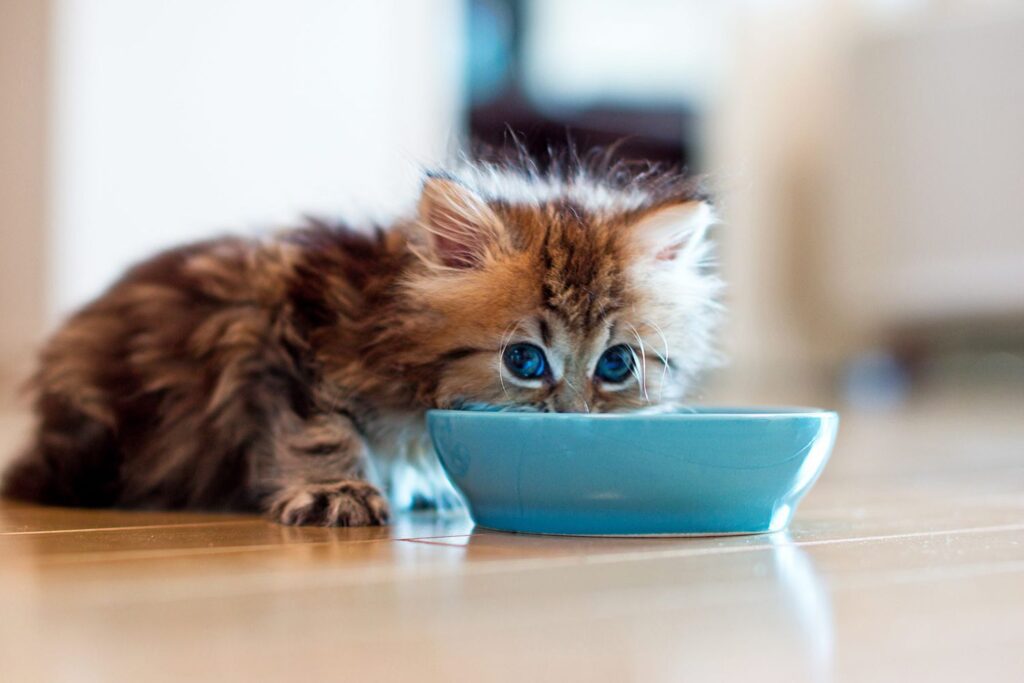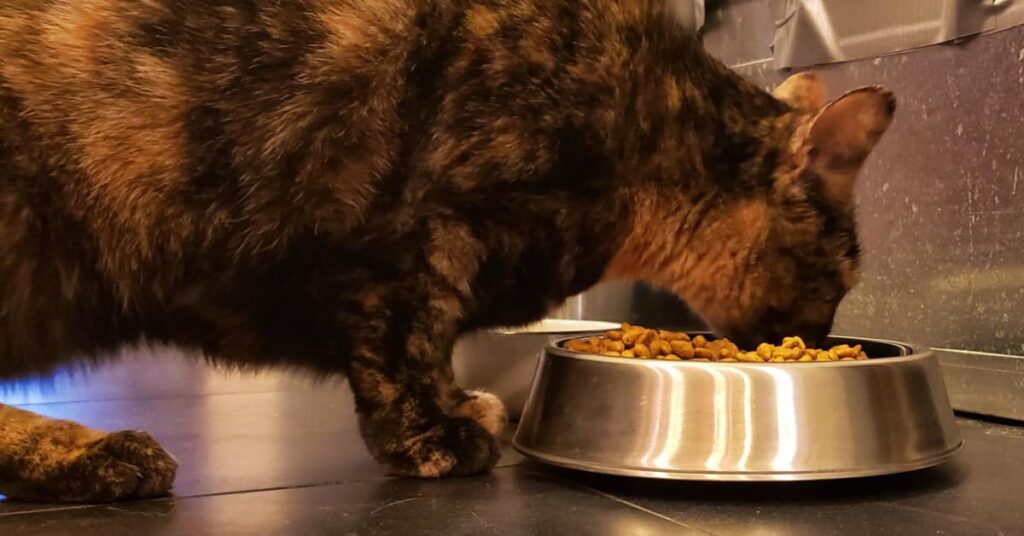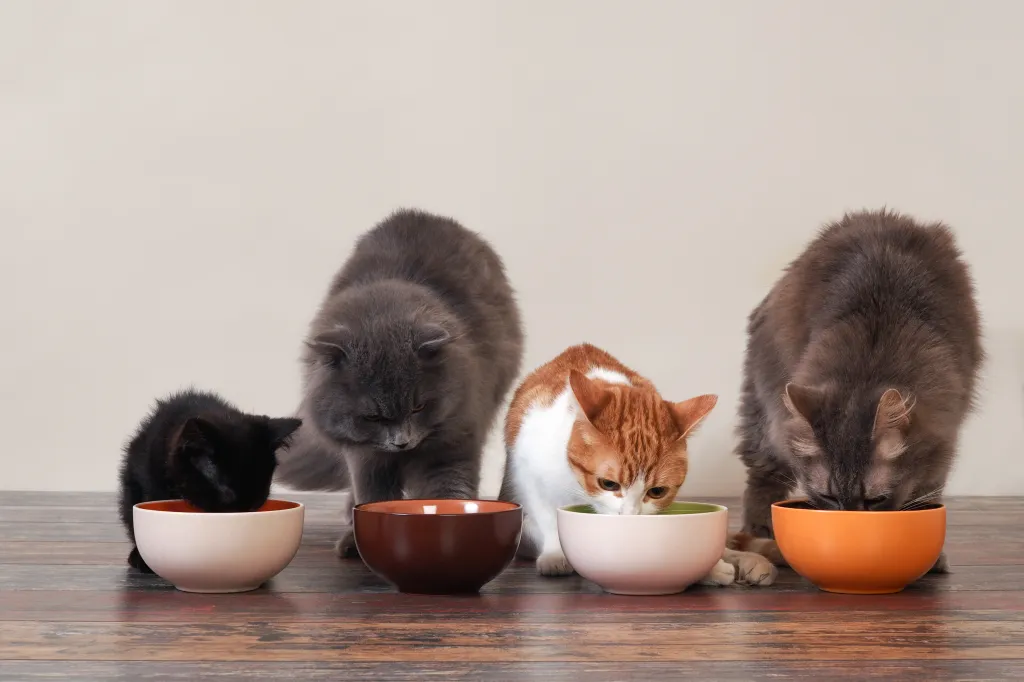If you’re a pet owner, you may wonder what is the difference between kitten and cat food. They both, after all, serve our dear feline companions. But knowing the differences will help you to guarantee the health and growth of your cat at every phase of life.
Table of Contents
Kitten Food vs Cat Food: Key Differences
During their first year, kittens grow and change quickly, so their food needs are different from those of adult cats. Cats need to eat a lot of energy, proteins, fats, vitamins, and minerals during this important time so that their bones, muscles, and internal systems can grow. Their metabolic rate is much higher than an adult cat’s, which means they burn energy much more quickly and need food that can meet their nutritional needs.
Nutritional Needs for Kittens
Kitten food is specially prepared to include greater quantities of critical nutrients. For example, kitten food contains much more protein than adult cat food since protein is a building ingredient of muscles and other structures. Furthermore, kitten food often contains DHA (docosahexaenoic acid), an omega-3 fatty acid that is essential for brain and eye development. Without proper quantities of essential nutrients, a kitten’s growth may be impeded, putting them at risk for developmental problems.
Nutritional Needs for Adult Cats
Adult cats, on the other hand, are no longer developing, therefore their dietary demands change from constructing to maintaining their bodies. As a consequence, adult cat food is designed to offer a balanced diet that promotes general health while avoiding excessive calories that may contribute to obesity. Adult cat food’s nutritional composition focuses on weight maintenance, joint wellness, a lustrous coat, and optimum dental health.
Read more: How to soften dry cat food?
Difference of Essential Nutrients
The ingredients in kitten and adult cat food change to fulfill your pet’s individual nutritional needs at each stage of its life. While both forms of food provide necessary nutrients, the amounts and components differ greatly.
Kitten Food vs Cat Food : Ingredients Comparison
Kittens need particular nutrients in greater amounts than adult cats. Taurine is an amino acid that is essential for proper heart function, eyesight, and reproduction. While taurine is included in both kitten and adult cat meals, kitten food has greater quantities to support the fast growth that occurs during the early stages of life.
As cats mature, their nutritional requirements change. For example, although adult cats still need taurine, their demand for high calcium levels decreases as their bones and teeth mature. Adult cat food balances these vitamin levels to avoid oversupplementation, which may be as hazardous as a lack. The combination of vitamins, minerals, and other elements in adult cat food is intended to maintain a mature cat’s health, with an emphasis on maintenance rather than development.

What Happens if Your Kitten Eats Cat Food?
Kittens have different dietary requirements than adult cats. They are fast developing, thus they require a diet high in protein, fat, and necessary vitamins and minerals. Kitten food is designed to match these requirements, with a larger calorie content and a variety of nutrients that promote development and energy.
It is normally safe for a kitten to eat cat food on occasion. However, persistently giving kittens cat food might result in nutritional inadequacies. Cat food lacks the required nutrients in enough levels for a developing kitten, perhaps resulting in stunted development or a weakened immune system.
Is Cat Food Safe for Kittens?
Kittens can eat small amounts of cat food, but it’s not recommended that they eat it all the time. Cat food made for older cats has less protein and fat than food made for younger cats. It might not hurt your kitten right away, but it will lose energy and food, which will stop them from growing. Over time, this could lead to health problems like weak muscles and bad bone growth.
To make sure your kitten grows up to be a healthy adult cat, you should feed them kitten food until they are ready to switch to adult cat food.
Can You Give an Adult Cat Kitten Food?
Feeding kitten food to an adult cat on occasion is normally safe, but it is not good for their long-term health. Kitten food is calorie-dense and rich in protein and fat, which might lead an adult cat to gain weight if given often. Over time, this might result in obesity and other health complications, such as diabetes and joint difficulties.
However, if your adult cat is underweight or recuperating from sickness, your veterinarian may prescribe kitten chow since it contains more calories. Always speak with your veterinarian before making nutritional modifications for your pet.
When Should I Stop Feeding My Kitten Kitten Food?
Kittens grow quickly in their first year, and their dietary requirements shift as they mature. Most veterinarians advocate transitioning from kitten to adult cat chow about 12 months of age. By this point, your cat’s development rate has slowed, and they no longer need the increased calorie and nutritional density of kitten food.
Some bigger cat breeds, such as Maine Coons, develop at a slower rate and may need kitten food for up to 18 months. Your veterinarian can provide the best advice depending on your cat’s breed and specific requirements.

When to Switch From Kitten Food To Cat Food?
The transition from kitten food to cat food should be gradual to prevent digestive issues. Begin by combining a tiny quantity of adult cat food with your kitten’s current diet, gradually increasing the proportion of adult food over a week or two. This cautious transition allows your cat’s digestive system to acclimate to the new diet without creating tummy distress.
During this time, keep an eye out for signs of discomfort in your cat, such as vomiting or diarrhea. If any problems emerge, slow down the transition or see your veterinarian for help. {1}
Feeding Recommendations
Feeding your cat the right amount and type of food is crucial to their health and well-being. The feeding recommendations for kittens and adult cats differ significantly, reflecting their different nutritional needs.
For Kittens
Kittens need to eat more often because they have smaller bellies and more energy needs than adult cats. Kittens should usually be fed three to four small meals a day to make sure they get enough calories and nutrients to keep up with their fast growth. As kittens get bigger and their stomachs get bigger, you can slowly cut back on how often they eat. When kittens are about six months old, they can usually handle eating two to three times a day, which is the same amount of food that adult cats should eat.
For Adult Cats
Adult cats, on the other hand, consume less calories per pound of body weight than kittens. Overfeeding may cause obesity, a major health issue in adult cats. It is critical to follow the feeding instructions on the cat food container and alter portion amounts depending on your cat’s activity level, age, and health status. Monitor your cat’s weight and body condition score on a frequent basis to ensure they are receiving the proper quantity of food.
Conclusion
The health and welfare of your feline depend on an awareness of the variations between kitten and cat diets. While adult cats need a balanced diet that preserves their health without generating weight gain, kittens need a nutrient-dense diet that promotes their growth and development. Selecting the correct diet for every phase of your cat’s life guarantees their growth into a content, healthy friend.
Remember that, in doubt, always consult with your veterinarian to make sure your cat is getting the finest diet possible.

